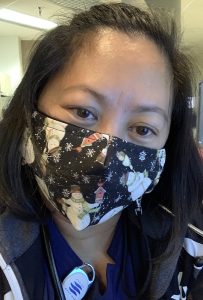PHOENIX – Filipino nurses make up just 4% of the national nursing workforce, but according to National Nurses United, 30.1% of registered nurses who’ve died of COVID-19 in the U.S. were Filipino.
Nurses of color make up about 57.7% of all RNs who have died of COVID-19, said National Nurses United, which represents 170,000 nurses.
Since March of last year, nurse Jennifer Somera has been on the front lines of the pandemic in metro Phoenix, working for a medical surgical unit at a hospital. Somera, who has been a nurse for more than two decades, said she was “floated,” or reassigned, to a COVID-19 unit in the past year, but only a half-dozen or so times.

Jennifer Somera, a Phoenix nurse, has made more than 1,700 masks since the pandemic began more than a year ago. She sews them at the dinner table while her son does his homework. (Photo courtesy of Jennifer Somera)
“Even though we were on the clean side (meaning no COVID-19 patients), we still wore masks, goggles, and washed hands all the time,” Somera said. “Approximately like maybe four, five, six times, only when I was floated to a COVID floor.”
She wasn’t placed on a COVID floor often, but she still took precautions outside of the unit, and contracted the virus anyways.
In December 2020, however, Somera and her family contracted COVID-19 after a small gathering to celebrate her father’s 80th birthday.
“I was so scared,” she recalled. “I really tried, almost a year … and then it happened. It still happened – we all got COVID last Christmas.”
Her family – Somera, both her parents, her husband and her older daughter – recovered with little or no lasting side effects, and Somera is back at work and pursuing another way to give back from home.
While the family was in quarantine, she received help from the president of the Philippine Nurses Association of Arizona, Erlinda Singarajah.
“She dropped food, water, anything, she kept in touch all the time,” Somera said. “Always asking if there’s things, something that I need for my family. She’s so amazing.”
The Philippine Nurses Association of Arizona aims to utilize professional leadership, mentorship, and clinical expertise to promote the advancement and betterment of Filipino-American nursing practice and foster a positive image of the group, which has 10,000 members nationwide.
Singarajah has been able to help several people throughout the pandemic using an anonymous email help line for association members.
“They can then log onto our website and be anonymous,” Singarajah said.
The help line, called Magkakapatid tayo … magtulungan tayo, is Tagalog for “We are brothers and sisters … we should help one another.” It was created to help members run errands, receive prayers for deceased loved ones or healing prayers in times of need.
Singarajah said the pandemic has made things very personal for her and the association.
“We’re all spread out throughout the different hospitals, so, when one nurse is affected with COVID, we are all affected,” she said.
Nurses across the country struggled with the supply of personal protective equipment when the pandemic was declared more than a year ago. Such items as the yellow gowns used in pandemics, N95 masks and face shields and goggles, Somera said.
Somera has taken it upon herself to make more than 1,700 cloth masks for people all across the country.
Somera gave them away to co-workers, friends and family who didn’t have any masks when the pandemic began.
In addition to making masks, she has also hand sewn surgical caps for her co-workers in the hospitals.
“I do it until sometimes after midnight,” she said. “While tutoring my kid, like on the working table, I’m sewing.”
For her, it’s a way of giving back to the community and helping those in a time of need.

